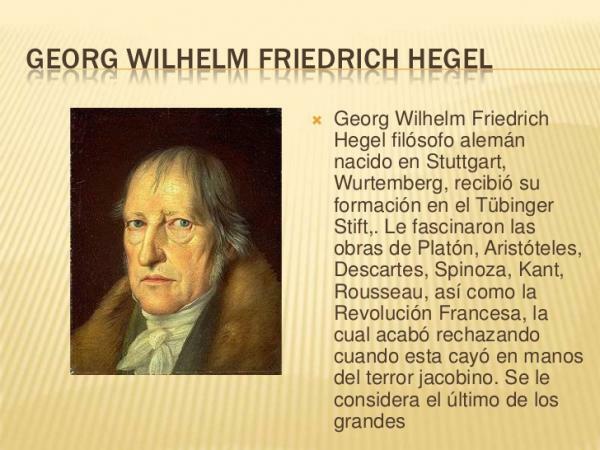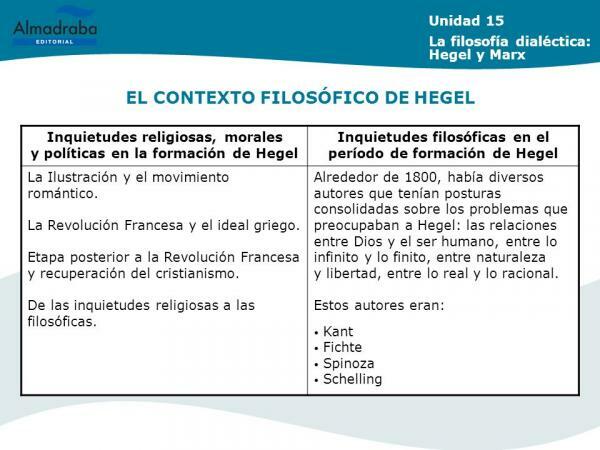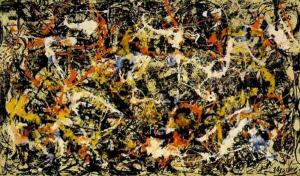Hegel's philosophy

This lesson from a TEACHER is dedicated to Hegel's philosophyGerman idealistic philosopher and one of the greatest representatives of the history of western thought, a true turning point in Western philosophy, and also in Russia, in the middle of the 19th century. Develop the dialectical method, from the study of nature, study of the environment and the history of humanity, as an interrelated whole.
Hegel speaks of a Absolute Spirit, as the foundation of human existence, which develops based on immanent laws, and following a dialectical process. Because everything changes, everything flows and becomes in the history of the human being and the world, like a dialectical process, in which a stage is opposed by its opposite, to finally be overcome both.
Index
- Brief biography of Hegel
- Dialectics in Hegel's Philosophy
- The 3 stages of reality and consciousness
- The absolute spirit and its manifestation in history
Brief biography of Hegel.
Georg Wilhelm Friedrich Hegel was born in Stuttgart, on August 27, 1770 into a Protestant family, so after the secondary stage, Hegel
he enters the theology department from the University of Tübingen (1788-1793), and that is where he defends his thesis. He receives influences from Schelling, Hölderlin, Kant or Schiller.In 1807, he wrote the most representative work of him, "Phenomenology of the Spirit”, Where the philosopher develops the idea of the movement of consciousness, from the data of the senses, from evident perception, to true knowledge. Because it is only from reason that the human being comes to know the truth.
Hegel addresses various fields of knowledge, philosophy of law, ethics, logic, phenomenology of the mind, literature, Greek, Latin, mathematics or the history of religions.
In 1811, he married Maria von Tuher and in 1816, he moved to Heidelberg, and wrote the "Encyclopedia of Philosophy”. Two years later he begins teaching at the University of Berlin. His success was such that his classes were attended by students from all over Europe, and in fact, his philosophy of state and law became the official philosophy of Prussia.
Hegel died in 1831, leaving the world without a great thinker. The official version says that the philosopher was sick with cholera and that killed him.

Image: Slideshare
Dialectics in Hegel's philosophy.
The starting point of Hegel's philosophy is that all reality can be known through reason. All that can be thought, therefore, it is real and backwards. Reason manifests itself in the world through absolute reality. So, if there is an identification between the existence and the idea, it means that reality can be known from the knowledge of the concepts. Thus, logic, which is the science that studies concepts, is identified with metaphysics, or science of the real, and of its essence.
The Hegelian dialectic consists of a process by which one idea leads to another contrary. That is, the reality is antagonistic and it always becomes its opposite, to reach equilibrium, to overcome the contradiction (thesis / antithesis / synthesis). But this is not a process linear, but circular, since it does not end with the harmonic overcoming of the opposites, but the synthesis, will inevitably lead to the denial of it, and everything begins again, on the wheel of history.

Image: SlidePlayer
The 3 stages of reality and consciousness.
Hegel distinguishes 3 stages in reality:
- The being-in-itself, or the stage of the spirit, which becomes "other" once it is situated in the physical world, that is, in space and time, and thus becomes being for itself or nature.
- Being-for-itself becomes consciousness and therefore, it is the opposite of spirit. This, beyond being a simple denial, becomes the overcoming of both stages. From consciousness, therefore, the spirit arises again.
- Being-in-itself and for itself, which is the overcoming of the two stages previous ones, which wraps them in a single one and then denies it again.
Stages of consciousness
In this process, consciousness goes through 3 different stages:
- The stage of the spirit subjective
- The stage of the spirit objective
- The upper stage of absolute spirit

Image: Hegel. Net
The absolute spirit and its manifestation in history.
According to Hegel, the Universal Spirit (Weltgeist) manage history through individuals and nations. This manifestation of the Universal Spirit is not subject to human laws, since the heroes of the history, those who have contributed to its development, are fundamental in the history of the humanity.
The philosopher understands that the story goes through different stages in its evolution:
- Period of youth
- Period of maturity
- Period of death
But death does not mean the end, but the birth of a new stage, that is, of a new nation. The purpose of the dialectic of history is the Liberty, foundation of the human spirit, and that is only possible within the Condition, where the law, and the individual, voluntarily abides by them.

Image: palmera.pntic.mec.es
If you want to read more articles similar to Hegel's philosophy: summary, we recommend that you enter our category of Philosophy.
Bibliography
Georg Wilhelm Friedrich Hegel. Introduction to the Philosophy of Universal History. Ed. Tecnos.
Georg Wilhelm Friedrich Hegel. Phenomenology of the Spirit. Ed. Alliance



